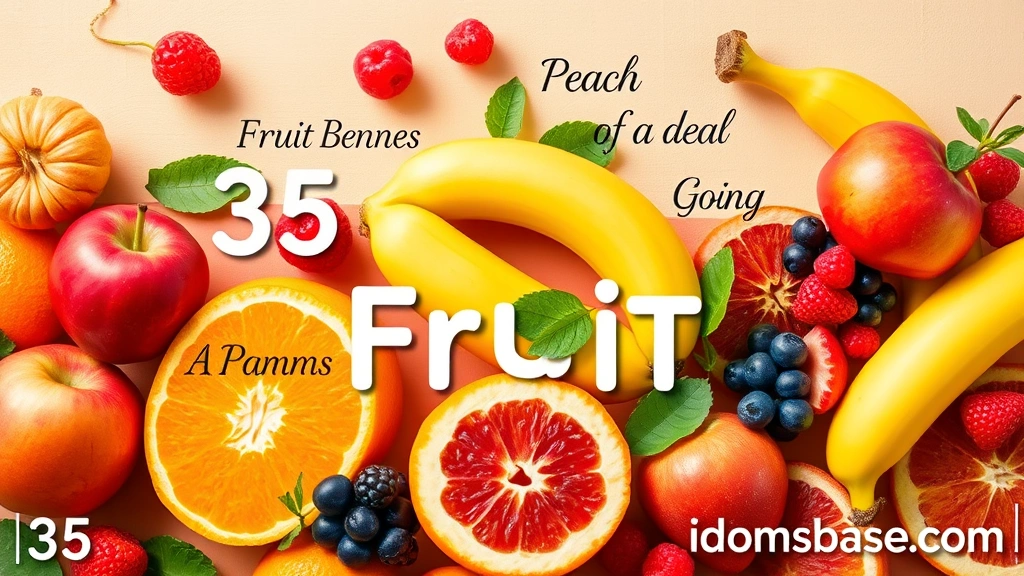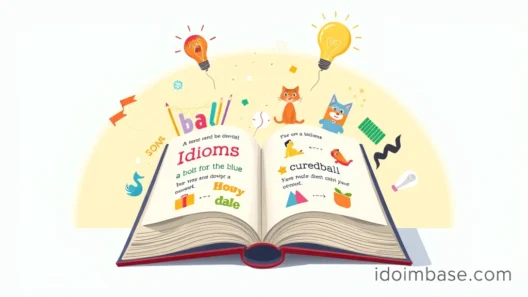Have you ever noticed how much our language is spiced up with wonderful, vivid expressions? It's like a secret code that makes conversations so much more colorful and fun! And guess what? Fruits, those delicious gifts from nature, have inspired a whole basketful of these fantastic phrases. From apples to oranges, and even a few lemons, these fruity idioms add a zest to our everyday chats.
Learning these idioms isn't just about sounding clever; it's about understanding the nuances of English, especially if you're navigating the global market. They pop up everywhere – in books, movies, and even business meetings! So, get ready to peel back the layers and discover 35 juicy idioms about fruit that will truly sweeten your vocabulary. Let's dive in!
35 Juicy Idioms About Fruit
Get ready to pick some of the most delightful and common fruit idioms. Each one comes with a simple explanation and an example, so you can start using them right away!
Apples & Pears
1. An Apple a Day Keeps the Doctor Away
This classic idiom suggests that eating healthy (like an apple) regularly can help you stay well and avoid illness.
Example: "Ever since I started my morning walks, I feel so much better. An apple a day keeps the doctor away, right?"
2. The Apple of My Eye
Someone who is "the apple of your eye" is a person you cherish above all others, someone you adore.
Example: "My granddaughter is the apple of my eye; I just love spending time with her."
3. Upset the Apple Cart
To "upset the apple cart" means to spoil a plan or disturb an existing situation.
Example: "His sudden resignation really upset the apple cart for our project timeline."
4. A Bad Apple
A "bad apple" refers to one person in a group who causes trouble or has a negative influence on the others.
Example: "We had to let go of one employee; he was a bad apple spoiling the team's morale."
5. Compare Apples and Oranges
This idiom means to compare two things that are fundamentally different and cannot be meaningfully compared.
Example: "Trying to compare the benefits of working from home versus working in an office is like comparing apples and oranges."
6. Apple Polisher
An "apple polisher" is someone who tries to gain favor with a person in authority through flattery or excessive politeness.
Example: "He's always complimenting the boss; he's such an apple polisher."
7. The Apple Doesn't Fall Far from the Tree
This idiom means that children often have similar characteristics or behaviors to their parents.
Example: "Her daughter is so talented at painting, just like her mother. The apple doesn't fall far from the tree!"
8. One Rotten Apple Spoils the Barrel
This means that one bad person or thing can spoil an entire group or situation.
Example: "We need to address this issue quickly, one rotten apple spoils the barrel, and we don't want the whole team affected."
Bananas & Berries
9. Go Bananas
To "go bananas" means to become very excited, enthusiastic, or even crazy.
Example: "The crowd went bananas when their favorite band came on stage."
10. Top Banana
The "top banana" is the most important person in a group or organization, the leader.
Example: "She's the top banana in the marketing department; everyone looks to her for guidance."
11. Cherry-Pick
To "cherry-pick" means to select only the best or most desirable items from a group.
Example: "When we hired new staff, we really tried to cherry-pick the most qualified candidates."
12. Life is Just a Bowl of Cherries
This idiom describes a life that is easy, pleasant, and carefree.
Example: "Ever since she got that promotion, for her, life is just a bowl of cherries."

13. Second Bite at the Cherry
This means getting a second opportunity to do something, especially after failing the first time.
Example: "After losing the first match, they're hoping for a second bite at the cherry in the championship."
14. Sour Grapes
"Sour grapes" refers to an attitude where someone dismisses something as inferior because they couldn't have it themselves.
Example: "He said he didn't want the job anyway, but I think it's just sour grapes because he didn't get it."
15. In a Nutshell
While not strictly a fruit, "nutshell" is often grouped with common food idioms. It means to summarize something very briefly.
Example: "So, in a nutshell, we need to increase our online presence."
Lemons & Limes
16. When Life Gives You Lemons, Make Lemonade
This optimistic idiom encourages you to make the best out of a bad situation.
Example: "I lost my job, but I'm using this time to start my own business. When life gives you lemons, make lemonade!"
17. A Lemon
A "lemon" refers to something, usually a car, that turns out to be defective or worthless.
Example: "I bought a used car last month, and it's been in the shop three times already. It's a real lemon!"
18. Not Worth a Hill of Beans
Again, "beans" aren't fruit, but this idiom expresses that something is of very little value or importance.
Example: "All his promises aren't worth a hill of beans if he doesn't follow through."
Peaches & Plums
19. Peachy Keen
This phrase means that everything is excellent, wonderful, or going very well.
Example: "How's your new project going? Oh, it's peachy keen!"

20. A Peach
Describing someone as "a peach" means they are a very kind, pleasant, or attractive person.
Example: "My new neighbor is an absolute peach; she brought us a welcome pie!"
21. Plum Job
A "plum job" is a highly desirable position, often one that is easy and well-paid.
Example: "After years of hard work, he finally landed a plum job at that tech company."
22. Plums in Your Mouth
If someone speaks with "plums in their mouth," they are speaking in a very affected or posh way.
Example: "He sounds like he has plums in his mouth when he tries to speak formally."
Oranges & Grapes
23. An Orange
While not as common as other fruit idioms, sometimes "an orange" can be used metaphorically to denote something that stands out in a group, or something distinct.
Example: "In a sea of blue, her bright orange dress was certainly an orange." (Less common, more illustrative)
24. Go Grape
To "go grape" is not a standard idiom. However, if one were to coin it, it might imply becoming very obsessed or enthusiastic about something, much like the process of making wine where grapes are central. (Illustrative, not a common idiom)
25. Grapevine
To hear something through the "grapevine" means to learn information informally, through gossip or rumor.
Example: "I heard through the grapevine that the company is planning a big announcement next week."
Other Fruity Phrases
26. Bear Fruit
To "bear fruit" means to yield positive results or success after effort.
Example: "All their hard work on the project finally bore fruit when they secured the deal."

27. Forbidden Fruit
"Forbidden fruit" refers to something that is desired precisely because it is prohibited or illicit.
Example: "The thrilling adventure felt like forbidden fruit, making it even more tempting."
28. Low-Hanging Fruit
"Low-hanging fruit" refers to the easiest tasks or solutions that can be achieved quickly with minimal effort.
Example: "Let's tackle the low-hanging fruit first, like updating our website, before moving on to the bigger challenges."
29. The Fruits of Your Labor
This phrase refers to the positive results or rewards that come from hard work.
Example: "After years of studying, she's now enjoying the fruits of her labor with a successful career."
30. Go Pear-Shaped
To "go pear-shaped" means for a plan or situation to go wrong or fail unexpectedly.
Example: "Our picnic plans went pear-shaped when it started raining heavily."
31. Like a Peach (Perfect)
This is similar to "peachy keen" or "a peach," meaning something is perfect or excellent.
Example: "The new software update works like a peach; no glitches at all!"
32. Fruitcake
Someone who is a "fruitcake" is a crazy or eccentric person.
Example: "My eccentric uncle is a bit of a fruitcake, but we love him."
33. Packed Like Sardines (in a can)
While "sardines" aren't fruit, this idiom about being tightly packed is often used when describing crowded spaces, similar to how fruit can be packed.
Example: "The train was so crowded, we were packed in like sardines." (Illustrative, not fruit-specific)
34. Go to Seed
When a plant "goes to seed," it stops producing fruit/flowers and focuses on producing seeds. Metaphorically, it means to decline in quality, appearance, or vigor.
Example: "After he retired, he let himself go to seed a bit, but now he's getting back in shape."
35. Pulp Fiction
This refers to a genre of fiction printed on cheap "pulp" paper, known for its sensational content. Not directly about fruit but uses the word "pulp."
Example: "He loves reading old pulp fiction novels for their thrilling plots."
Key Takeaways
- Language is Rich: English is full of colorful expressions, and fruit idioms are a prime example of how everyday objects inspire vivid phrases.
- Context is Key: Understanding the meaning of these idioms often requires knowing the context in which they are used.
- Boost Your Fluency: Learning idioms can significantly improve your English fluency and help you sound more like a native speaker.
- Cultural Insight: Idioms often offer a peek into the cultural values and common experiences of English speakers.
- Simple & Fun: Many fruit idioms are quite straightforward and can be easily incorporated into your daily conversations.
FAQ: Your Fruity Idiom Questions Answered!
Q1: What is an idiom, and why are fruit idioms so common?
A: An idiom is a phrase or expression whose meaning cannot be understood from the ordinary meanings of its words. For example, "kick the bucket" doesn't mean to literally kick a bucket; it means to die. Fruit idioms are common because fruits are universal, relatable objects that have been part of human life and culture for centuries. Their characteristics (sweetness, sourness, ripeness, decay) lend themselves easily to metaphorical meanings.
Q2: How can I remember so many idioms?
A: The best way to remember idioms is to use them!
- Contextualize: Try to connect the idiom to a real-life situation or imagine a scenario where you'd use it.
- Practice: Incorporate a new idiom into your conversations or writing a few times a week.
- Visualization: Create a mental image for each idiom. For "go bananas," imagine a monkey going wild!
- Group Them: Like we did here, group similar idioms together (e.g., all apple idioms) to help with recall.
- Review: Regularly revisit the idioms you've learned.
Q3: Are fruit idioms used in formal or informal settings?
A: Most fruit idioms are considered informal or semi-formal. You'll hear them often in casual conversations, social gatherings, and even some business discussions where the tone is relaxed. For very formal writing or speeches, it's generally safer to use more direct language, although a well-placed idiom can sometimes add flavor if your audience understands it.
Q4: Do other languages have similar fruit idioms?
A: Yes, absolutely! Many languages have their own unique idioms, and some might even have counterparts to English fruit idioms. For instance, the concept of "sour grapes" exists in various forms across different cultures because the human experience of disappointment and envy is universal. Exploring idioms in other languages can be a fascinating way to learn about cultural similarities and differences.
Q5: Can I make up my own fruit idioms?
A: While you can certainly be creative with language, for an expression to be considered an idiom, it needs to be widely understood and used by a community of speakers. Idioms evolve organically over time within a language. So, while you can invent new phrases, they won't be "idioms" until they gain common usage and their meaning becomes conventional rather than literal.
So there you have it! A whole bushel of fantastic fruit idioms to add to your linguistic toolkit. We hope you feel more confident and excited to use these vibrant expressions in your daily conversations. They truly are the spice of life – and language! Keep practicing, keep exploring, and watch your English vocabulary blossom.





